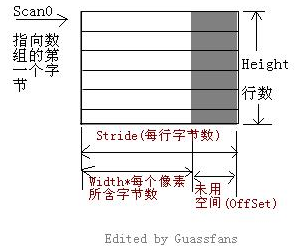先說Image,Image 就是個圖像,不能實例化,提供了位圖和源文件操作的函數。本篇文章他就是來打醬油的,這裡提供一個Bitmap轉成BitmapSource的方法。
1 [DllImport("gdi32")]
2 static extern int DeleteObject(IntPtr o);
3 /// <summary>
4 /// bitmap轉換為bitmapsource 以適應wpf的image
5 /// </summary>
6 /// <param name="pic"></param>
7 /// <returns></returns>
8 public static BitmapSource GetMapSource(Bitmap pic)
9 {
10 IntPtr ip = pic.GetHbitmap();
11 BitmapSource bitmapSource = System.Windows.Interop.Imaging.CreateBitmapSourceFromHBitmap(
12 ip, IntPtr.Zero, Int32Rect.Empty,
13 System.Windows.Media.Imaging.BitmapSizeOptions.FromEmptyOptions());
14 DeleteObject(ip);
15 return bitmapSource;
16 }
接下來說Bitmap和BitmapData。
Bitmap類
Bitmap對象封裝了GDI+中的一個位圖,此位圖由圖形圖像及其屬性的像素數據組成.因此Bitmap是用於處理由像素數據定義的圖像的對象.該類的主要方法和屬性如下:
1. GetPixel方法和SetPixel方法:獲取和設置一個圖像的指定像素的顏色.
2. PixelFormat屬性:返回圖像的像素格式.
3. Palette屬性:獲取和設置圖像所使用的顏色調色板.
4. Height Width屬性:返回圖像的高度和寬度.
5. LockBits方法和UnlockBits方法:分別鎖定和解鎖系統內存中的位圖像素.在基於像素點的圖像處理方法中使用LockBits和UnlockBits是一個很好的方式,這兩種方法可以使我們指定像素的范圍來控制位圖的任意一部分,從而消除了通過循環對位圖的像素逐個進行處理,每調用LockBits之後都應該調用一次UnlockBits.
BitmapData類
BitmapData對象指定了位圖的屬性
1. Height屬性:被鎖定位圖的高度.
2. Width屬性:被鎖定位圖的高度.
3. PixelFormat屬性:數據的實際像素格式.
4. Scan0屬性:被鎖定數組的首字節地址,如果整個圖像被鎖定,則是圖像的第一個字節地址.
5. Stride屬性:步幅,也稱為掃描寬度.
這裡要重點說說Stride屬性,這個和Width有什麼區別呢,可以這麼說,如果你的圖片大小也就是圖片字節是4的整數倍,那麼Stride與Width是相等的,否則Stride就是大於Width的最小4的整數倍。在處理過程中,Stride肯定是4的整數倍,這裡是個坑啊。。。

盜張圖,連接寫在文章底部
先看看BitmapData的應用,我的場景是,我有一個一維像素點陣數組,裡面放的是每個像素點的灰度值,知道寬和高,要轉換成bitmap
1 /// <summary>
2 /// 像素點陣轉換為bitmap
3 /// </summary>
4 /// <param name="rawValues">byte[]數組</param>
5 /// <param name="width">圖片的寬度</param>
6 /// <param name="height">圖片的高度</param>
7 /// <returns>bitmap圖片</returns>
8 public static Bitmap ToGrayBitmap(byte[] rawValues, int width, int height)
9 {
10 Bitmap bmp = new Bitmap(width, height, System.Drawing.Imaging.PixelFormat.Format8bppIndexed);
11 BitmapData bmpData = bmp.LockBits(new System.Drawing.Rectangle(0, 0, width, height), ImageLockMode.WriteOnly, System.Drawing.Imaging.PixelFormat.Format8bppIndexed);
12 //// 獲取圖像參數
13 //bmpData.Stride = width;
14 int stride = bmpData.Stride; // 掃描線的寬度
15 int offset = stride - width; // 顯示寬度與掃描線寬度的間隙
16 IntPtr iptr = bmpData.Scan0; // 獲取bmpData的內存起始位置
17 int scanBytes = stride * height;// 用stride寬度,表示這是內存區域的大小
18 //// 下面把原始的顯示大小字節數組轉換為內存中實際存放的字節數組
19 int posScan = 0, posReal = 0;// 分別設置兩個位置指針,指向源數組和目標數組
20 byte[] pixelValues = new byte[scanBytes]; //為目標數組分配內存
21 for (int x = 0; x < height; x++)
22 {
23 //// 下面的循環節是模擬行掃描
24 for (int y = 0; y < width; y++)
25 {
26 pixelValues[posScan++] = rawValues[posReal++];
27 }
28 posScan += offset; //行掃描結束,要將目標位置指針移過那段“間隙”
29 }
30 //// 用Marshal的Copy方法,將剛才得到的內存字節數組復制到BitmapData中
31 System.Runtime.InteropServices.Marshal.Copy(pixelValues, 0, iptr, scanBytes);
32 bmp.UnlockBits(bmpData); // 解鎖內存區域
33 //// 下面的代碼是為了修改生成位圖的索引表,從偽彩修改為灰度
34 ColorPalette tempPalette;
35 using (Bitmap tempBmp = new Bitmap(1, 1, System.Drawing.Imaging.PixelFormat.Format8bppIndexed))
36 {
37 tempPalette = tempBmp.Palette;
38 }
39 for (int i = 0; i < 256; i++)
40 {
41 tempPalette.Entries[i] = System.Drawing.Color.FromArgb(i, i, i);
42 }
43
44 bmp.Palette = tempPalette;
45
46 //// 算法到此結束,返回結果
47 return bmp;
48 }
這代碼也是網上找的,具體哪裡已經忘記了。至於24位位圖數據其實就是 一個像素點有rgb三個值而已,道理一樣。
同樣,我們也可以根據圖片得到他的灰度數組
1 //8位位圖得到除去文件頭信息的一位灰度數組 2 3 4 BitmapData bmpData = map.LockBits(new System.Drawing.Rectangle(0, 0, map.Width, map.Height), ImageLockMode.ReadOnly, System.Drawing.Imaging.PixelFormat.Format8bppIndexed); 5 6 //// 獲取圖像參數 7 8 int stride = bmpData.Stride; // 掃描線的寬度 9 10 int offset = stride - map.Width; // 顯示寬度與掃描線寬度的間隙 11 12 IntPtr iptr = bmpData.Scan0; // 獲取bmpData的內存起始位置 13 14 int scanBytes = stride * map.Height;// 用stride寬度,表示這是內存區域的大小 15 16 //// 下面把原始的顯示大小字節數組轉換為內存中實際存放的字節數組 17 18 mapdata = new byte[scanBytes]; //為目標數組分配內存 19 20 System.Runtime.InteropServices.Marshal.Copy(iptr, mapdata, 0, scanBytes); //copy內存中數據到數組中
這裡對與bitmapdata的操作方式是ReadOnly
為什麼說stride是坑呢,因為在工作中,我有一個大小不為4的整數倍的文件,通過上面方法將他們轉為圖片,然後操作之後我需要存回去,繼續存成文件的形式,如果你直接存回去你會發現你的文件變大了。這時候就需要避開stride。其實stride占據的空間什麼都沒有做,我們如何遍歷構建圖片,就如何反遍歷回數組就可以了
public static byte[] GetMapData(byte[] MapData,int width,int height)
{
var length = MapData.Length;
if(width==length/height)
{
return MapData;
}
int offset=length/height-width;
var scanBytes = width * height;
byte[] RawMapData = new byte[scanBytes];
int posScan = 0, posReal = 0;
for(int x=0;x<height;x++)
{
for (int y=0;y<width;y++)
{
RawMapData[posScan++] = MapData[posReal++];
}
posReal += offset;
}
return RawMapData;
}
至於24位位圖轉8位位圖,還是看這位博主的博客,他總結了很多,我還是覺得opencv比較快捷方便。
http://blog.csdn.net/jiangxinyu/article/details/6222302
另外還看到了一下c#處理圖片的方法,比如光照,霧化,浮雕等,請移步下面鏈接
http://www.pin5i.com/showtopic-20228.html
種一棵樹最好的時間是十年前,其次是現在。